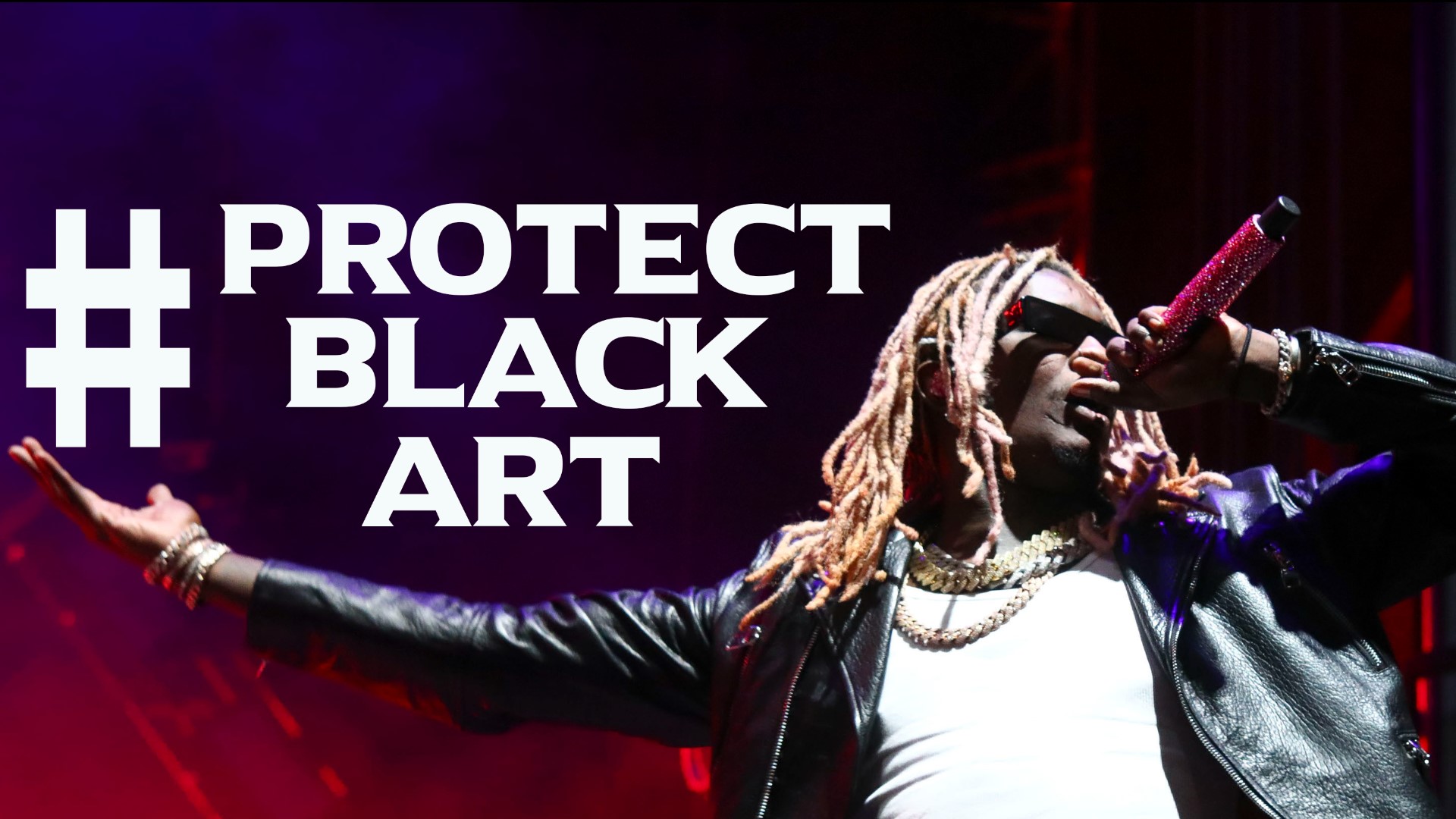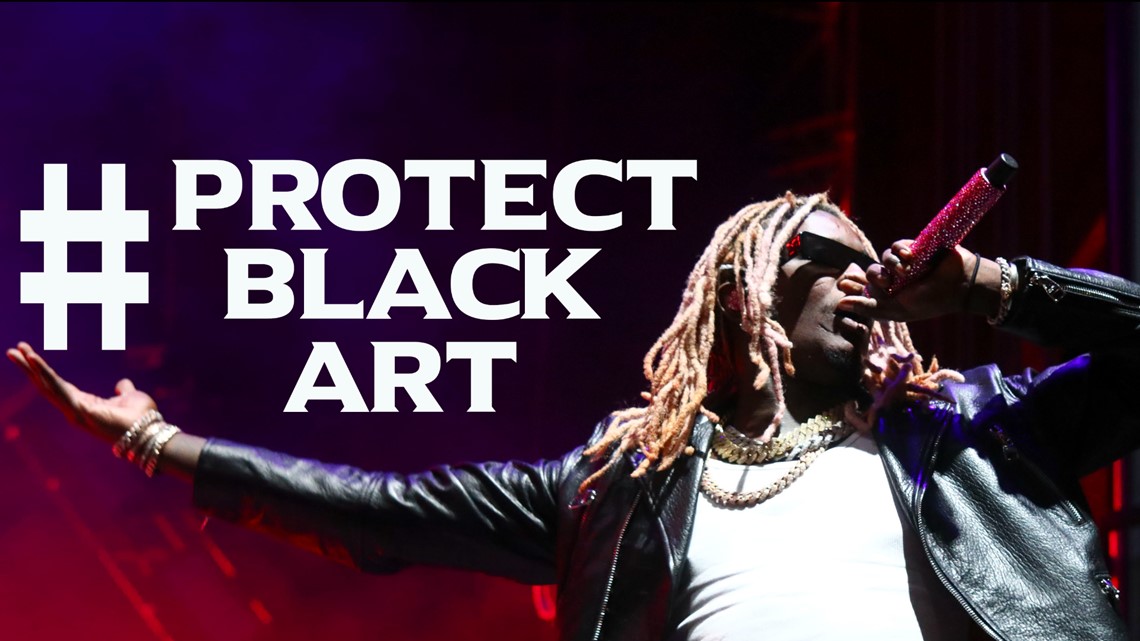JEFFERY: The full Young Thug Story | Part 3: Protect Black Art
As Young Thug's case nears a trial date, 11Alive’s ‘Jeffery’ series gives an exclusive lens into what this case means – legally, artistically and culturally.

About 'Jeffery'
The 11Alive exclusive ‘Jeffery’ series unravels the high-profile grand jury indictment of Atlanta rapper Jeffery Williams, better known as Young Thug. We explore the impact of the controversial indictment, which alleges that his prominent record label, YSL, is allegedly connected to street gang activity, according to Fulton County prosecutors.
The recent events reignited a decades-long conversation about the use of rap lyrics in courtrooms across the country, the movement to protect Black art, and the precedent this case could set.
As this notorious case nears a trial date, 11Alive’s ‘Jeffery’ series gives an exclusive lens into what this case means – legally, artistically and culturally. And where do the lines blur between art and reality?
The rest of this series will premiere soon exclusively on 11Alive+, available on Roku and Amazon Fire TV. Text "plus" to 404-885-7600 to download 11Alive+. For more info, visit: https://www.11alive.com/watch.
Part 3 Protect Black Art
Young Thug’s arrest sparked a nationwide movement to protect lyrics from being used in courtrooms.
His label and music executive Kevin Liles, who is also his business partner, launched a petition to #ProtectBlackArt. The movement quickly spread, garnering more than 65,000 signatures.
“Today in courtrooms across America, Black creativity and artistry is being criminalized,” the Change.org petition reads. “With increasing and troubling frequency, prosecutors are attempting to use rap lyrics as confessions. This practice isn’t just a violation of First Amendment protections for speech and creative expression. It punishes already marginalized communities and silences their stories of family, struggle, survival and triumph.”
Liles told 11Alive’s Neima Abdulahi that this movement is bigger than the upcoming trial.
“It's protect Black art. Protect our rights. Protect our freedom of speech. Protect creative expression,” Liles said. “This isn’t about YSL. This isn’t about Gunna or Thug. This is about freedom of speech. This is about protecting the very things that have come from blood, sweat and tears.”
Prominent hip-hop artists Post Malone, D.J. Khaled, Meek Mill and others joined Liles to speak out and raise awareness.
“We need to protect freedom of speech when it comes to art,” D.J. Khaled said in the viral video.
“Being able to speak freely through music is a big win for the culture,” artist London On Da Track said.
Rap lyrics on trial - again
Thirteen songs are listed as evidence in the lengthy indictment, which claims Young Thug is the founder of an alleged gang in Fulton County.
Some of the Young Thug’s lyrics listed in the indictment:
- "I never killed anybody but I got something to do with that body”
- "I killed his man in front of his momma"
- "YSL won't fold, pick his *** off from the balcony"
- “We are committing them crimes"
- "Roll one up for the gang"
- "You wanna be slime? Go catch you a body"
Young Thug’s attorney Brian Steel filed a motion to remove his lyrics as evidence.
“The admission and use of these lyrics/poetry/artistry against Mr. Williams in his upcoming trial would be a Constitutional violation and an abuse of discretion, too prejudicial and unconstitutional,” the motion reads. “Moreover, using these lyrics/poetry/artistry/speech against Mr. Williams is racist and discriminatory because the jury will be so poisoned and prejudiced by these lyrics/poetry/artistry/speech as same is unlawful character assassination.”
The judge will take this issue up in court on December 15. Meanwhile, this isn’t the first time rap lyrics wound up in court. The #ProtectBlackArt petition ignited a decades-old debate.
Grammy-nominated rapper Snoop Dogg is one of the most notable artists to face a trial with his lyrics at the forefront. In 1996, the artist sat on trial for murder with prosecutors citing lyrics from his song "Murder Was The Case" in the murder trial.


The use of rap lyrics resurfaced in 2014 when an indictment accused rapper Bobby Shmurda of alleged crimes including conspiracy, reckless endangerment and possession of guns and drugs.
His song “Hot Boy” rose to the top of the Billboard charts shortly before his arrest.
There was speculation that his lyrics could be used to link him to crimes. Although his lyrics ended up out of the evidence pile, Shmurda served six years behind bars.
More recently, prosecutors tried to use rapper NBA YoungBoy’s lyrics against him in his trial for firearm possession. A judge later ruled his lyrics could not be considered evidence.
These are just a few of the many times hip-hop lyrics were brought into question in legal cases.
The lyric debate
There are many perspectives to the debate on using lyrics as evidence in court.
Is it artistic expression or is it reality? Is hip-hop under attack or are prosecutors cracking down on crime? We explore the many sides and perspectives to this conversation.
Art vs. Reality
Music tells a story, said Queen, hip-hop artist manager and sister of the late rapper Shawty Lo.
“Whether it's their story or not, they're telling a story,” she said. “If you lose that art of storytelling, you're going to lose the art of music.”
“Sometimes rappers - they exaggerate,” author and trap music historian A.R. Shaw said. “Sometimes they say things that may not necessarily be true. Some of them may be based off experience.”
Shaw said this tactic brings more attention to their sound.
“Art has to be dangerous for it to be interesting,” he said. “Art has always been a sense of having some type of danger in it. Record labels know that this sense of danger, this sense of Black plight, sells.”
On top of that, Queen said, a lot of artists draw inspiration from their lived experiences.
“Most of the artists come from the projects. They come from broken homes,” she said. “If that's the environment that you come from, that's what you're going to talk about.”
Rapper T.I. told 11Alive’s Neima Abdulahi that hip-hop lyrics are often public enemy in courtrooms because the words are honest.
“It tells the truths that a lot of people who probably don't live in these conditions would like to believe don't exist,” he said.
Law vs. Lyrics
Fulton County District Attorney Fani Willis stayed firm on her use of lyrics in the RICO indictment against Young Thug and 27 other co-defendants in an August 2022 press conference.
“I have some legal advice,” Willis said to the press. “Don’t confess to crimes in rap lyrics if you don’t want them to be used.”
Meanwhile, Young Thug’s attorney, Steel, disagrees.
“It {lyrics} should never be used in a courtroom unless the prosecution can show that that lyric is an admission or confession,” Steel said in a sit-down interview with 11Alive.
Hip-hop vs. Other art forms
There is a history of rap lyrics on trial, but what about other genres of music and other types of art?
“Black art, it seems, is the only form of art that's ridiculed in that way,” Shaw said.
“A lot of times people can't separate reality from fiction,” T.I. said. “It's very easily done when we're talking about films. Very easily done when we're talking about video games.”
Rap music “creates a fear,” entertainment lawyer Dina LaPolt told 11Alive.
LaPolt represents top music artists across the globe. She wrote a column in Variety in 2021 after Maryland’s highest court ruled rap lyrics can be admitted as evidence. She warned the court’s move sets a “dangerous precedent.”
“It's not happening in any other genre of music,” she told 11Alive. “Now it's rap lyrics. It's kind of like this whole thing with Roe v. Wade. So now let's just turn back, you know, women's reproductive rights, what's next LGBTQ? What's next interracial marriage?”
Bob Marley’s song, “I Shot the Sheriff,” or Johnny Cash’s lyric, “I killed a man in Reno to watch him die,” never saw time in court, Liles argued.
“Because it was born and bred out of someplace that a lot of people don't understand,” the 300 Ent. CEO explained. “We are constantly attacked because we're telling our truths. We're telling our stories.”
T.I. argued video games don’t see scrutiny under the law either.
Protections vs. Prosecution
A piece of legislation is fighting to keep lyrics out of the courtroom.
The bill, Restoring Artistic Protection (RAP) Act, sponsored by Georgia’s Rep. Hank Johnson, pushes to ban lyrics as evidence in criminal cases claiming it protects freedom of expression.
“I believe in the First Amendment. It’s one of our most precious rights,” DA Willis said at a press conference announcing the charges against Young Thug and others. “However, the First Amendment does not protect people from prosecutors using it as evidence.”
LaPolt argued this practice can be dangerous.
“People are pulling lyrics from people's Instagram, and their demo tapes, and TikTok, and they're using this as evidence without any other nexus to the crime,” she explained. “We can't do that. It creates a horrible, horrible precedent.”
States like California and New York passed the RAP Act as state law. If it passes Congress, it would be the first federal law to limit lyrics in court.
Still, Willis maintained her position to admit lyrics as evidence.
“I will continue to do that,” she told the press. “People can continue to be angry about it.”
Attack on crime vs. Attack on culture
Where do we draw the line on artistic expression and criminal confessions?
Former Atlanta police officer Tyrone Dennis served the city for 16.5 years. He said the line is blurry.
“It has become so controversial because the same lyrics that have made some of these artists famous, from a law enforcement standpoint, they're incriminating,” he said.
Prosecutors see this move as a way to stop crime in the city. Meanwhile, the industry sees this as a way to stop artists from expressing their creative minds.
“We have to ask ourselves, why is this the only art form that is spoken of being brought into court?” T.I. questioned. “I think it's an attack on culture more than anything.”
Dennis disagrees.
“This is not an attack on hip hop. It's an attack on crime,” he said. “You can't say I'm an artist but still have your feet in the street doing crime.”
The trend of lyrics promoting crime and violence, Dennis said, needs to change.
“The same things that make the city great also makes it bad because hip-hop culture comes with shootings, comes with violence and different things like that,” he explained. “I think that is putting everybody on notice that it's not going to be tolerated much longer.”
Dennis said record labels also need to be accountable.
“The record companies are responsible for what they're putting out because they're selling a culture,” he said.
Jury selection for Thug’s trial starts on January 9. Shaw said he expects the result to impact the future of the industry.
“This may be a watershed moment in hip hop where artists may be more careful about what they put out and also the labels as well,” he said.
